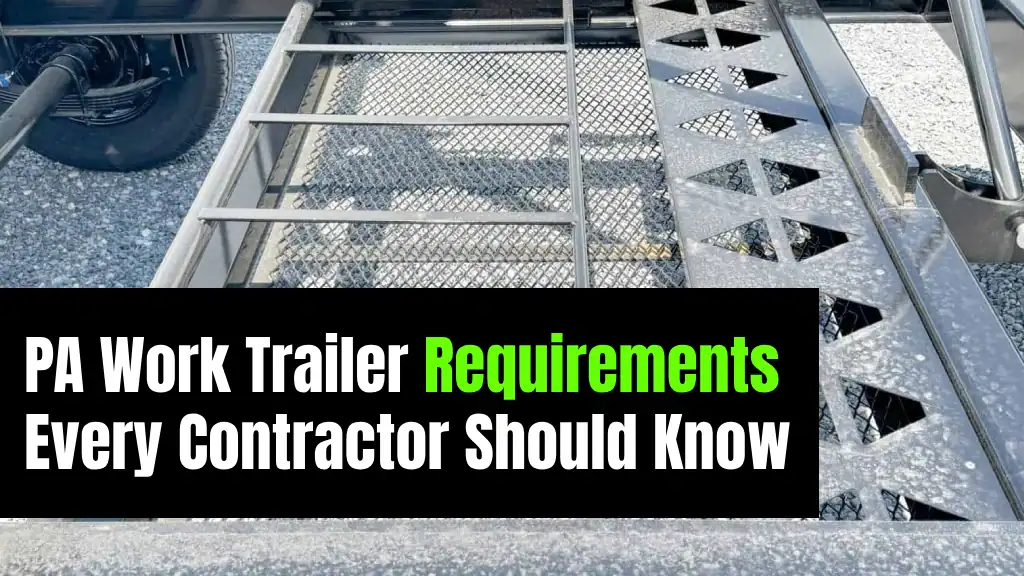Popular Searches:
Displaying top search terms based on the last 90 days.
Popular Searches:
Displaying top search terms based on the last 90 days.

If you haul equipment in Pennsylvania, roadside trailer inspections can feel like a gamble. One missed detail and your trailer could be placed out of service, your crew stranded, and your day wrecked by unexpected fines. But this isn’t about fear, it’s about preparation. Knowing exactly what Pennsylvania State Police and Motor Carrier Enforcement officers are looking for gives you the edge to stay compliant, safe, and on the road.
Here’s what inspectors look for and how to avoid the most common (and costly) mistakes.
You don’t need to commit a traffic violation to be pulled over. Pennsylvania allows random inspections of any commercial trailer, especially those used for work or hauling equipment. A full Level I roadside inspection covers both the driver and vehicle and typically takes 30 to 90 minutes, depending on circumstances.
Before anything else, an officer will want to see your paperwork. Make sure you have:
Your trailer’s connection to your tow vehicle is a top priority, and inspectors will meticulously check several key components.
They’ll look for a properly rated coupler that ensures your trailer stays aligned with the towing vehicle. You’ll also need two safety chains that are crossed and robust enough to handle your trailer’s Gross Vehicle Weight Rating (GVWR).
Additionally, a breakaway cable, separate from the chains, is essential for safety. If your drawbar extends over five feet, it must have a red flag or light for visibility.
Keep in mind that missing or improperly installed safety chains are among the quickest ways to get your trailer shut down during an inspection. Ensuring these critical connections are in perfect working order is not just about compliance; it’s about safeguarding everyone on the road.
If your trailer is equipped with brakes or has a Gross Vehicle Weight Rating (GVWR) exceeding 3,000 pounds, a thorough inspection of its braking system is paramount. Inspectors will verify that all service brakes are fully functional, showing no signs of excessive wear, air leaks, or damaging metal-on-metal contact. This ensures the trailer can stop safely and effectively in conjunction with the tow vehicle.
A critical safety feature also subject to scrutiny is the breakaway system. Inspectors will physically pull the pin to confirm that the system activates immediately upon simulated detachment from the towing vehicle. This ensures that the trailer will come to a controlled stop even if it becomes separated from the primary vehicle.
Be warned: if more than 20% of your trailer’s brakes are found to be out of adjustment, it constitutes an automatic out-of-service violation, meaning your trailer cannot be legally operated until the issue is resolved.
Even a single bad tire can lead to a citation or worse. Inspectors will check:
Lighting is one of the most commonly cited issues. Make sure:
Carrying a spare light bulb or plug tester can often be the difference between getting a warning and receiving a fine.
A walkaround inspection may seem simple, but it’s crucial. Inspectors will look for:
Keep in mind that PA restricts trailer width to 8 feet 6 inches. Going over this without proper permits will result in being flagged and may lead to fines or the trailer being placed out of service.
Your trailer must hold its load securely. That includes:
Inspectors reference FMCSA securement rules, so strap ratings and anchor points matter.
These are not minor infractions! They can actually result in immediate out-of-service orders and fines.
Taking five minutes before departure can save you hours of downtime and costly violations.
If your trailer is road-ready and meets every safety requirement: brakes, lights, tires, hitch, and load securement, and your paperwork is in order, then inspections will be fast and painless. Stay ahead of the game, and roadside stops become just another part of doing business right.
Need help getting your trailer ready for PA roads? The team at Brechbill Trailers is here to help with inspections, repairs, and expert guidance to keep your equipment legal and dependable.
The information provided here is for general guidance only and may not reflect the most current legal or regulatory requirements. Brechbill Trailer Sales LLC makes no guarantees as to the completeness or accuracy of this information and assumes no liability for errors, omissions, or outcomes resulting from its use. It is the sole responsibility of the operator to ensure their trailer, load, and operation comply with all applicable laws and safety standards. Brechbill Trailer Sales LLC is not responsible for any fines, penalties, damages, injuries, or losses that may result from reliance on this material. Always verify requirements with the appropriate regulatory authorities before operating your trailer.